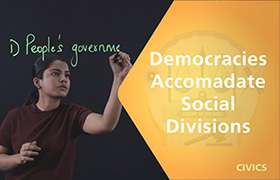CBSE Class 10 Answered
Is economic growth in democracies accompanied by increasing inequalities among the people?
or
do democracies lead to a just distribution of goods & opportunities? Explain
Asked by vatsalchoudhary41 | 27 Oct, 2015, 07:37: PM
No, I don’t believe that democracies do not lead to a just distribution of goods and opportunities because:
- There is a growth in economic inequality, even after individuals having political equality. This leads to rich becoming richer and poor remaining poorer. Some ultra rich people enjoy disproportionate share of wealth and incomes, while the poor faces only poverty.
- The income level of the people at the bottom is declining, which makes it difficult to them to meet their basic needs of housing, clothing, food, education and health.
- Even after poor being a large proportion of voters and the party unwilling to loose their votes, the poor has to face various poverty problems, which the government never appears to address.
Answered by Akanksha Kaul | 28 Oct, 2015, 01:53: PM
Application Videos
CBSE 10 - Civics
Asked by shivaingigrafiksh | 15 Jan, 2023, 07:53: PM
CBSE 10 - Civics
Asked by Akhilkardia | 12 Jan, 2023, 04:21: PM
CBSE 10 - Civics
Asked by balakrishnas361 | 05 Apr, 2022, 11:57: PM
CBSE 10 - Civics
Asked by Topperlearning User | 27 May, 2016, 01:03: PM
CBSE 10 - Civics
Asked by Topperlearning User | 15 Mar, 2016, 03:13: PM
CBSE 10 - Civics
Asked by Topperlearning User | 15 Mar, 2016, 03:12: PM
CBSE 10 - Civics
Asked by Topperlearning User | 15 Mar, 2016, 03:09: PM
CBSE 10 - Civics
Asked by Topperlearning User | 15 Mar, 2016, 03:08: PM
CBSE 10 - Civics
Asked by Topperlearning User | 15 Mar, 2016, 03:08: PM
CBSE 10 - Civics
Asked by Topperlearning User | 15 Mar, 2016, 03:07: PM




